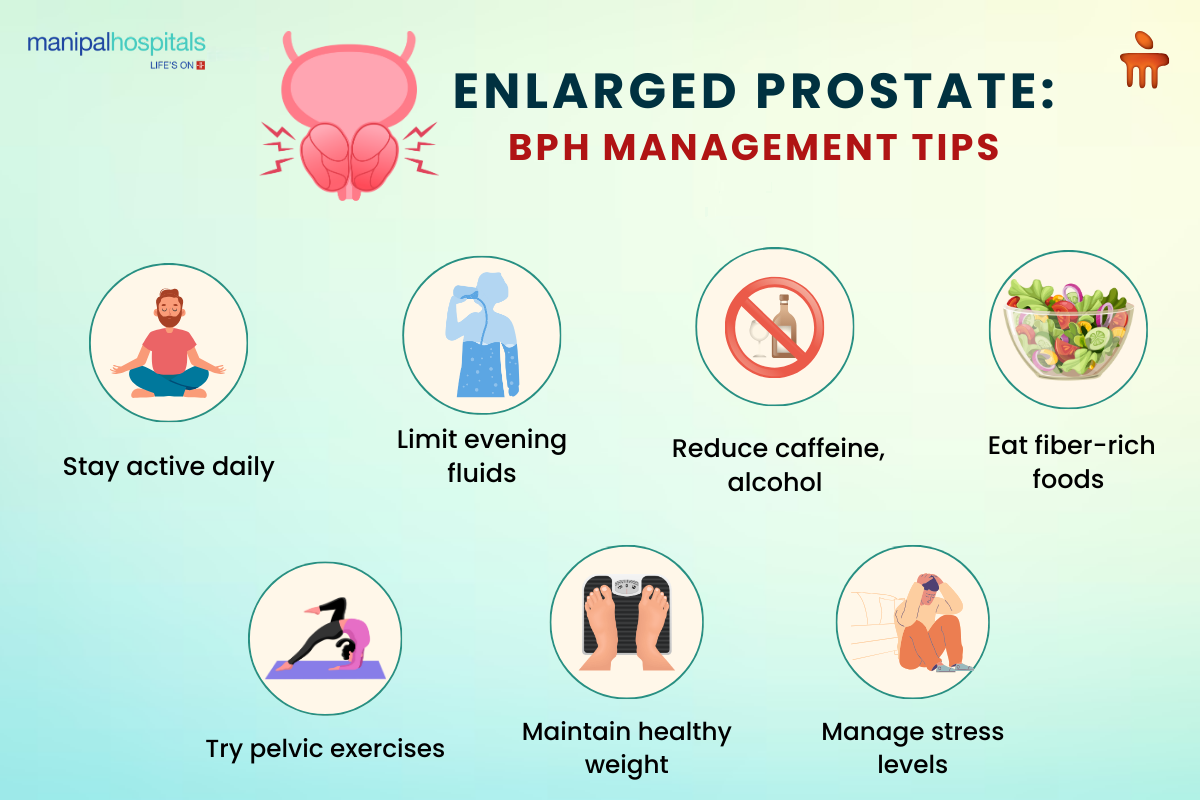
Benign Prostatic Hyperplasia (BPH), commonly known as enlarged prostate, is one of the severe conditions affecting millions of Indian men above 50 years of age. It may not be uncommon for most people to use medication, but it is known that lifestyle modifications have been seen to improve BPH symptoms and quality of life significantly. Apart from frequent urination and a weak stream of urine, there is nocturia as well with this condition. These all can disturb sleep and social life, affecting a person from within. Explore below the informative, practical lifestyle changes that can complement BPH treatment.
Synopsis
What is BPH?
As men age, the prostate tends to enlarge naturally. Being overweight, particularly around the stomach, puts a strain on the bladder and makes BPH symptoms worse. Stress can also tighten the muscles of the pelvic floor and aggravate urinary symptoms. That’s why BPH treatment isn't solely related to the prostate – the health of the bladder also plays an important role in its care.
Bladder training and a healthy routine can go a long way in helping symptoms. Some lifestyle changes can also relieve pressure on the bladder and boost urinary function. Prostate inflammation is usually common in many patients, which can exacerbate prostate symptoms. Anti-inflammatory food choices and frequent exercise minimise this inflammation.
Common BPH symptoms include:
-
Frequent or urgent need to urinate
-
Increased nighttime urination (nocturia)
-
Difficulty starting urination
-
Weak or interrupted urine stream
-
Feeling of incomplete bladder emptying
-
Straining to urinate
Less common but more severe enlarged prostate symptoms that need immediate medical care include:
-
Inability to urinate at all (acute urinary retention)
-
Blood in the urine
-
Pain during urination or ejaculation
-
Urinary tract infections (UTIs)
Lifestyle Adjustments for Treatment of BPH
Let’s get to know about the lifestyle changes that can help with an enlarged prostate:
Mindful Fluid Intake
Adjust fluid consumption during the day. Decrease fluids at night (2-3 hours before sleep) to reduce nighttime urine runs. Still, ensure a balance of daily fluid intake (approximately 2 litres) to avoid concentrated urine and bladder irritation.
Dietary Adjustments
Eat a diet that is anti-inflammatory or anti-irritant. Such foods include turmeric, amla (Indian gooseberry), flaxseeds, and green leafy vegetables. Avoid bladder irritants like caffeine and alcohol, and reduce intake of other irritating foods, such as spices, that tend to aggravate urinary urgency and frequency.
Regular Exercise
A 30-minute daily routine of moderate exercise should be maintained. Activities like walking, swimming, and yoga may improve circulation to the pelvic area, reduce inflammation, and keep one in shape. Some pelvic floor exercises may help strengthen the pelvic floor muscles that control urination.
Bladder Training
Practice withholding urination for increasingly longer durations (when comfortable) to teach your bladder to retain more urine. This may decrease the frequency of bathroom use. Begin with small increments of 5-10 minutes past the first urge and extend gradually.
Stress Management
Practice relaxation techniques like deep breathing, meditation, or yoga. Stress and anxiety can increase urinary frequency and urgency by tensing the pelvic floor muscles. Regular relaxation practices can help maintain better urinary control.
Keep Your Weight in Check
Especially abdominal fat acts as extra pressure on the bladder and adds to the BPH symptoms. A balanced diet full of fruits, vegetables, and whole grains and low in processed foods can help with maintaining a healthy weight.

Other Helpful Strategies
-
Manage other chronic diseases, especially diabetes and hypertension, as these two can aggravate prostate symptoms if not well controlled.
-
Stay warm during winter. The cold can make your blood vessels constrict, which may aggravate BPH symptoms for a while.
-
Try timed voiding – empty your bladder every 3-4 hours instead of waiting for the urge to hit.
When to See a Doctor?
Consulting an experienced urologist in Bangalore becomes imperative in the following scenarios:
-
Sudden inability to void
-
Presence of blood in urine
-
Recurrent pain in the lower abdomen or back
-
Presence of fever or chills along with urinary symptoms
-
Significant interference with daily activities despite lifestyle modifications
Conclusion
BPH is a common problem among elderly males, but it need not rule your life. Simple changes, in addition to medication, can greatly alleviate symptoms and brighten your outlook on life. It is always best to consult healthcare providers before making any significant changes to an existing BPH treatment regimen.
FAQ's
Some Ayurvedic herbs like Gokshura (Tribulus terrestris) and Ashwagandha may help manage prostate symptoms. However, consult an Ayurvedic practitioner and inform your regular doctor before trying these remedies.
Most men notice improvements within 4-6 weeks of consistent lifestyle changes. However, individual responses vary based on symptom severity and consistency in following recommendations.
Total avoidance is not always necessary. Most men derive benefit from tapering off or consuming caffeine earlier in the day instead of avoiding it altogether.
Recurring sexual activity can actually benefit some men with BPH by maintaining prostate health and minimising congestion. Yet experiences are different for everyone.
No. Many men are able to control their symptoms with medication and lifestyle modification alone. Surgery is usually reserved only when other measures have not worked or complications arise.





















 5 Min Read
5 Min Read

















